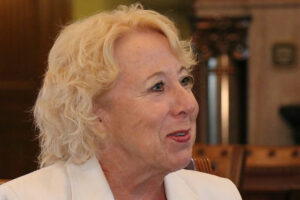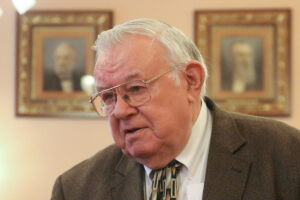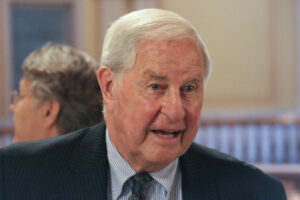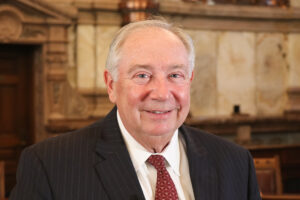Topic: Kansas Employees Retirement System (KPERS)

Interview of Christine Downey, August 2, 2019
Interviewed by Dale Goter
Former State Senator Christine Downey recalls her three terms in the Kansas Senate (1993-2004) during her 2019 oral history interview. With her background as a teacher, education issues were important to her as the era of school-funding litigation continued. She was involved in water-related policy making, in particular at the nexus of water quality and agricultural practices. She recalls her service in the Senate and on the Kansas Board of Regents first developing the policy and then implementing fundamental changes to the postsecondary education system. Ms. Downey discusses numerous instances of working across the aisle Show Moreto accomplish policy objectives that did not break on strict party lines. Show Less

Interview of Marge Petty, September 11, 2020
Interviewed by Patty Clark
This oral history interview of former Senator Marge Petty covers her 12 sessions in the State Senate representing a Topeka district (Senate 18). Petty talks about why she registered as a Democrat, challenged a sitting Republican woman Senator in the 1988 election, and won. She discusses specific issues such as the investigation of the KPERS venture capital investments with other Senators, healthcare issues, foster care, and education. The interview also chronicles her career after leaving the legislature in 2000. Petty talks candidly about losing that last election, after which she began working for the Kansas Corporation Show MoreCommission. Later, she decided to move back to Dallas and worked to secure an appointment from President Obama as a regional representative of Health and Human Services. Petty describes the process of going after that appointment. This is a wide-ranging interview that shows the energy and skills Petty brought to the public arena. Show Less

Interview of Ralph Skoog, July 17, 2015
Interviewed by Burdett Loomis
In his 2015 oral history interview, former Representative Ralph Skoog recalls a Kansas Legislature in transition. Ralph was initially elected to represent Topeka and Shawnee County in 1961, prior to the U.S. Supreme Court's Baker v. Carr 'one-person, one-vote' decision. His first 'district' was one-third of Shawnee County. When he returned to the House in 1967 after an unsuccessful campaign for Congress in 1964, he represented a more equal-size district of approximately 17, 000 residents of the County. Ralph recalls a legislature very much in transition at the beginning of the decline of rural domination of Show Morethe policymaking process and at the beginning of institutional change that came to fruition after the end of his last term. He recalls passage of important highway, prison, and school district consolidation legislation during his time of service in the House. Show Less

Interview of Robert (Bob) Storey, February 5, 2015
Interviewed by Burdett Loomis
Bob Storey in his 2015 oral history interview recalls his service in the Kansas Senate from 1969-1976. His recollection is of a senate that was in transition in terms of urban-rural influence on policymaking due to the one-person, one-vote principle enunciated by the U.S. Supreme Court in the mid-1960s. He recalls intricacies of interactions among senate leaders and governors and occasional intrigue in senate leadership elections. He also reflects on improvements in the functioning of state government during the years when reorganization and modernization of many state functions took place.

Interview of George Wingert, October 28, 2022
Interviewed by David Webb
The "legendary" George Wingert served in the Kansas House from 1971-1978, but his political career spanned 50 years, five governors and countless stories. He learned early on the importance of building connections to the Republican majority and leadership and when to vote your district even if your party leader objects. Wingert was involved with higher education issues and the changes to the correctional institutions and mental health institutions and many of the other progressive issues of that period. After leaving the legislature Governor Carlin appointed him to the Kansas Board of Regents where he and fellow Show Moreregent Jordan Haines "hired and fired" a lot of people including college presidents. Then he lobbied for dog racing issues for another 15 years. The interview concludes with a couple of interesting stories about his family's involvement with national Democratic politicians. Show Less

Interview of Jim Denning, April 13, 2023
Interviewed by Alan Conroy
Jim Denning served four years as Majority Leader for the Kansas Senate. His interview reveals his Western Kansas leanings, despite having worked, lived and represented Johnson County. HIs legislative interests included health care policy, funding KPERS and school finance. He described Senate Bill 9--KU Cancer designation--as one of his important contributions. Denning found that Governor Brownback’s tax plan was creating problems for Kansas – “too deep and unsustainable.” His philosophy was, "At the end of the day, you have to govern." Throughout his tenure in the Senate, Medicaid expansion was a pressing issue, but Show Morehe didn’t like the way the bills were constructed, so he developed a Republican alternative that he thought would be a model for the country. His interview details how he kept the Democratic alternative from passing, but his own bill was caught up in abortion politics and failed to pass. Denning led the Senate during 3 special sessions: school finance, COVID and repealing the Brownback tax plan. Historians will love this interview because of his candor and his position at a pivotal time in the legislature's history. Show Less

Interview of Nick Jordan, April 10, 2024
Interviewed by Chris Courtwright
Nick Jordan served in the Kansas Senate from 1995-2008 when he retired to run for Congress. In 2010 he accepted an appointment as Kansas Secretary of Revenue. Later, Governor Brownback moved him to the position of Secretary of Commerce. This interview reveals his leadership style in passing several substantive pieces of legislation: Kansas Economic Growth Act, Kansas Bioscience Authority, numerous tax bills, and incentives for economic development and the Kansas Center for Entrepreneurship. Jordan was regarded as one of the more powerful, productive and influential Senators in Kansas. His story, Show Moreas told in the interview covers his 40 - year career in the travel and tourism industry, his work in the Senate on economic development and his role in Governor Brownback's cabinet during the Kansas Great Depression. He speaks candidly about the Tax Experiment that characterized the Brownback administration. Nick Jordan's philosophy about how to succeed in an increasingly rancorous legislative environment reflects his Christian faith and a belief that treating people kindly, developing relationships regardless of political party is the best way to accomplish your goals. Show Less
